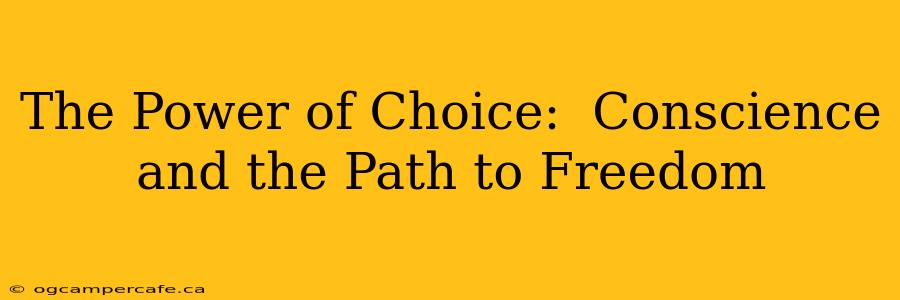The ability to choose, to forge our own path, is arguably the most fundamental aspect of human existence. But what truly empowers us to make meaningful choices? Many believe the answer lies in the development and cultivation of our conscience. This inner voice, this moral compass, guides our decisions, shaping not only our individual lives but the collective fabric of society. Understanding the power of choice, guided by conscience, is crucial to navigating the complexities of life and achieving true freedom.
What is Conscience?
Conscience isn't simply a gut feeling or a fleeting emotion. It's a deeply ingrained sense of right and wrong, developed through a complex interplay of factors. These include:
-
Personal Experiences: Our upbringing, relationships, and life experiences profoundly shape our moral compass. What we witness, learn, and internalize contributes to our understanding of ethical behavior.
-
Societal Norms: The cultural context in which we live plays a significant role. Societal values and expectations influence our understanding of acceptable and unacceptable conduct. What one culture considers morally sound may differ significantly from another.
-
Religious and Philosophical Beliefs: For many, religious or philosophical frameworks provide a moral foundation. These systems offer guidelines and principles that inform ethical decision-making. However, even without a formal belief system, individuals can develop a strong moral compass based on their own reasoning and values.
-
Reason and Reflection: The capacity for reason and critical thinking is paramount. Conscience isn't simply accepting pre-programmed beliefs; it involves actively evaluating situations, considering consequences, and making informed choices aligned with our values.
How Does Conscience Influence Our Choices?
A well-developed conscience acts as a filter, helping us navigate moral dilemmas. When faced with a decision, our conscience prompts us to consider:
-
The potential consequences of our actions: Will our choice harm or benefit others? Will it align with our values and beliefs?
-
The inherent morality of the situation: Is this action inherently right or wrong, regardless of potential outcomes?
-
Our personal integrity: Will this choice compromise our sense of self-respect and moral consistency?
By considering these factors, we can make choices that reflect our deepest values and lead to a more fulfilling life.
What if My Conscience Conflicts with Societal Expectations?
This is a common struggle. Societal norms can sometimes clash with individual conscience, leading to difficult choices. History is replete with examples of individuals who defied societal expectations to act according to their conscience, often at great personal cost. Think of figures like Martin Luther King Jr., who challenged racial segregation despite the social and legal consequences. This highlights the importance of self-reflection and the courage to stand up for what we believe is right, even when it's unpopular.
How Can I Strengthen My Conscience?
Cultivating a strong conscience is a lifelong process. It involves:
-
Self-reflection: Regularly examine your own values, beliefs, and actions. Ask yourself: Are my actions consistent with my principles? Where do I need to make adjustments?
-
Empathy and Compassion: Develop the ability to understand and share the feelings of others. This broadens our perspective and helps us make choices that consider the well-being of everyone involved.
-
Seeking diverse perspectives: Engaging with different viewpoints and cultures challenges our assumptions and expands our understanding of ethical complexities.
-
Continuous learning: Stay informed about important ethical issues and explore different philosophical and religious perspectives on morality.
Does a Strong Conscience Guarantee Perfect Choices?
No, not at all. Even with the best intentions, we make mistakes. The key is to learn from these mistakes, acknowledge our imperfections, and strive to do better in the future. The journey of developing a conscience is an ongoing process of growth and self-improvement.
Conclusion: Embracing the Power of Choice
The power of choice, guided by a well-developed conscience, is the cornerstone of freedom. It's not about achieving perfect morality but about striving to live a life of integrity, compassion, and responsible decision-making. By understanding and nurturing our conscience, we not only create a more fulfilling life for ourselves but contribute to a more just and ethical world.
